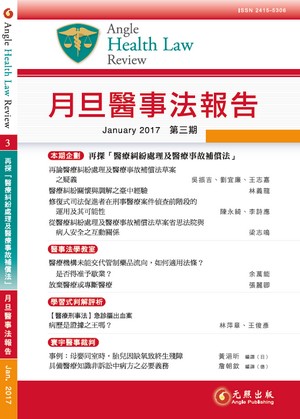從醫療糾紛處理急醫療事故補償法草案省思法院與病人安全之互動關係【本期企劃】 試閱
Rethinking the Relationship between the Court and Patient Safety from the Perspective of the Medical Dispute Act
醫療糾紛處理及醫療事故補償法草案反映臺灣引進病人安全運動(patient safety movement)相關理念之努力,本次立法的失敗,也提供臺灣社會思考相關理念如何更細緻法制化的契機。以此為背景,本文嘗試從「證據保護」、「早期真相發現」及「過失責任概念」三個角度討論病人安全運動和法院訴訟制度之間的互動關係。針對此一議題,臺灣既有文獻主要聚焦於醫事人員所為帶有歉意或同情的言論,是否可在法庭中做為證據。與此相較,同儕審查特權(peer-review privilege)相關證據法議題、訴訟外早期真相發現機制的建置,以及病人安全運動對傳統以個人行為為核心的過失責任概念帶來的挑戰,就較少被深入探討。本文主張,若臺灣社會未來再現推動醫療糾紛處理及醫療事故補償法立法之契機,對上述議題之深入討論與研究,實為不可或缺之前置作業。
The proposed Medical Dispute Act reflected a concerted effort to introduce the ideas of the patient safety movement (PSM) to the Taiwanese legal system. The fact that it failed to clear the legislative process, the paper argues, actually presents a precious opportunity for the Taiwanese society to re-examine in more depth how these ideas could and should be incorporated into the legal system. Against this backdrop, this paper examines the following subject areas relevant to the legalization of PSM ideas, including: 1) protection of information; 2) early discovery of truth; and 3) the doctrine of negligence liability. The existing literature typically focuses on the first subject area, in particular on the concept of apology laws, i.e., whether apologetic or sympathetic remarks offered by medical professionals can become evidence in the court. Other legal issues that have tremendous significance to the pursuit of patient safety, however, are often overlooked, which include: 1) peer-review privilege, 2) the establishment of early truth-finding mechanisms, and 3) alternative construction of the doctrine of negligence liability. This paper argues that serious investigation of these heretofore underappreciated topics will help lay a healthy foundation for the next round of legislative discussion over how to overhaul the medical malpractice dispute resolution system in Taiwan.
057-071






